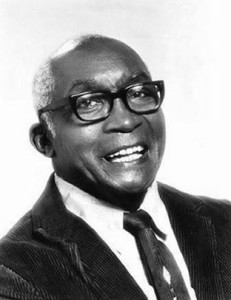
—By Cindy Jacobs
Jestie Joseph Hairston (nicknamed “Jester” by a teacher) was born in 1901, the grandson of slaves from the Hairston plantation at Belew’s Creek, North Carolina. He attended Massachusetts Agricultural College, graduated cum laude from Tufts University with a major in music, and studied music at Juilliard.
He spent 13 years in New York as assistant conductor of the Hall Johnson Negro Choir, a choir dedicated to preserving the original tenor and style of music passed down from the slaves. He moved to Hollywood in 1936, where he picked up a second career as an actor. He spent 15 years on the radio and TV versions of “Amos ‘n’ Andy.” In the 1980s, he played “Rolly Forbes” on the TV series “Amen.” He also acted in the films “To Kill a Mockingbird,” “Lady Sings the Blues,” “In the Heat of the Night,” “The Alamo,” and “Road to Zanzibar,” among others, and was one of the first black actors in the Screen Actors Guild.
Jester Hairston is perhaps most well known as the composer of “Amen” from the 1963 movie “Lilies of the Field.” His singing voice was overdubbed for Sidney Poitier’s in the film. Here is the incredibly moving final scene from “Lilies of the Field,” where Poitier’s character Homer Smith, having finished his work for the nuns, takes his leave during a reprise of “Amen.”
Hairston arranged approximately 300 Spirituals during his long life; he died in 2000 at the age of 98. We will be performing his arrangements of “Elijah Rock,” and “Hold On” at our Winter Concert. “Hold On” has a particularly significant subsequent history. The original (on which Hairston’s arrangement is based), like many African American spirituals, had a double meaning. The overt reference is to a Bible verse in the gospel of Luke, which gave the song a safe religious overlay. The underlying message for the slaves was to hold on for freedom. During the civil rights movement of the 1950s and ’60s, “Hold On” was adapted as the civil rights anthem “Keep Your Eyes on the Prize.” Here is a powerful version by Mavis Staples. You can clearly recognize the original melody from “Hold On.”

